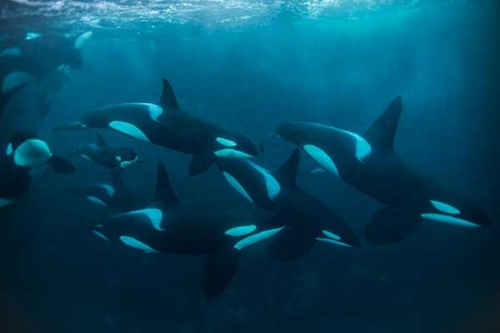The secret of the killer whale
Researching killer whales may help to resolve a long-standing mystery of humanity: why women must experience menopause and then lose fertility.
>> Assassin whale also suffers from menopause
Killer whales also experience menopause like humans
 The killer whale who has passed through the menopause is often trusted by the group to lead the way - (Photo: capitolotc.com)
The killer whale who has passed through the menopause is often trusted by the group to lead the way - (Photo: capitolotc.com)
Abnormal characteristics: Menopause occurs in every woman, but in the animal world, it is an extremely unusual sign. People can continue their lives after stopping reproduction, but for most animals, this is also the time when they die . Some primates, such as brown monkeys, orangutans, chimpanzees also experience this stage as humans, while elephants and short fin pig whales also fall into the same situation. However, only short-fin pig whales and killer whales can survive for many more years after losing fertility.
It has long been known that women will lose fertility to a certain age. Now, the scientific community happens to detect killer whales, which have separated from humans nearly 94 million years in evolution, also suffered from menopause, and this may provide clues. Important to allow experts to find out why.It is known that killer whales are one of the wild animals that must undergo menopause in their children, next to some primates.
In the long series of evolutionary history, the emergence of a trait that shortens fertility in a species is always the controversial topic of biologists, and there are currently a lot of theories to explain at Why does it happen in humans? Recently, a group of researchers from the University of Exeter and the University of York (UK) can decipher the cause behind the emergence of menopause, at least in the case of killer whales. They found that the termination of fertility in children freed the pressure of reproduction in veteran and experienced members of large families, allowing them to lead families to seek food, from It improves the survival of the whole herd.
According to a report in the Current Biology magazine, British scientists studied groups of killer whales in the wild that lived off the coast of British Columbia and Washington states during nine migratory seasons of the salmon. In total, they observed 102 whales, 58 of them were females, and noted the position of the first male when they arrayed trout fishing. They also used 35-year data on the region's whale population to identify individuals who have experienced menopause. On average, female killer whales over the age of 35 underwent this process . Researchers found individuals of reproductive age tended to lead the group during each prey. And especially in the years when the amount of salmon dropped, they became more and more frequent.
The results of the study may help explain why menopause occurs in humans, because it allows older women to communicate their knowledge and support the care of young members. than. Professor Darren Croft, the University of Exeter's behavioral ecologist, says there is growing evidence that menopause is an adaptation in life . And his colleague, Dr. Lauren Brent, analyzed that the results showed that individuals of reproductive age could support the herd by passing on ecological knowledge. The wisdom of older members of the weaker sex can help explain why female killer whales and elderly women continue to live long despite the lack of capacity to extend the race.
- The killer whale finally gave up the corpse after 17 days floating in the ocean
- Whale fossils are located in ancient killer whales
- 'Ocean killer' hunts penguins
- The first white killer whale was discovered
- Rescue killer killer whales on the rocks
- The world's oldest killer whale died at the age of over 100
- Spectacular killer whales hunting
- The killer whale is three meters dead because of the storm blowing up the shore
- Strangely, killer whales make a living for handicapped children
- Video: Watching the whale 'killer' chasing a strange ship
- Killer whales will have the world's largest artificial shelter in the United States
- Mother whale carries a spectacular escape between the killer whales
 'Fine laughs' - Scary and painful torture in ancient times
'Fine laughs' - Scary and painful torture in ancient times The sequence of numbers 142857 of the Egyptian pyramids is known as the strangest number in the world - Why?
The sequence of numbers 142857 of the Egyptian pyramids is known as the strangest number in the world - Why? History of the iron
History of the iron What is alum?
What is alum?